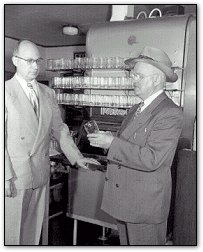 Four students in a graduate seminar in investigative reporting at Northeastern University put together and published an impressive feature on restaurant inspection disclosure – or lack thereof — in the Boston Globe this morning.
Four students in a graduate seminar in investigative reporting at Northeastern University put together and published an impressive feature on restaurant inspection disclosure – or lack thereof — in the Boston Globe this morning.
The authors/students had fun focusing especially on so-called high-end restaurants and their many food safety failings.
"For almost a month late this spring, devotees of Tealuxe, the popular Newbury Street tea house and cafe, was closed — for mechanical repairs, its manager, Ryan Moore, was cited as insisting in an interview Friday….
"But, according to an internal report prepared by the Boston Public Health Commission, the restaurant was shuttered because at least 21 people, including 10 employees, were exposed to the salmonella bacteria the first week of May, and of those, 11 patrons and three employees became ill."
The feature story lists dozens of restaurant infractions at various fancy eateries,
"At too many restaurants, inspectors regularly find violations that suggest that managers and owners do not take in-house food safety training seriously, especially for immigrant employees with limited English language skills. As a result, many workers do not wash their hands between tasks or wear hair restraints, do not change gloves when appropriate or even wear gloves when handling bread and other ready-to-eat items.
"Such findings may surprise most consumers, because the city’s Division of Health Inspections, which is part of the Inspectional Services Department, keeps its reports buried in file drawers. An ISD website — http://www. cityofboston.gov/isd/health/mfc/court.asp — offers only limited and outdated information. And what the site does have is difficult to understand for anyone who is not a food safety specialist.
"When the Globe asked for the inspection reports, ISD said it would take 78 hours of staff time, plus copying costs, to produce them — at a cost of $2,039. When the newspaper challenged the estimate, city officials recalculated the time involved, and reduced the cost to about $600.
"Also kept under wraps, available only through a formal public records request, are the identities of close to 400 food service establishments — the Federalist included — that have been temporarily shut down since 2002 for food safety violations.
In an interview, Thomas J. Goodfellow, the director of ISD’s Division of Health Inspections, could not explain why Boston, unlike other cities, had not publicized the closings, or even posted them online. State law, Goodfellow said, does not require it."
There’s just too many stinky hands.
Publicly available grading systems rapidly communicate to diners the potential risk in dining at a particular establishment and restaurants given a lower grade may be more likely to comply with health regulations in the future to prevent lost business.
More importantly, such public displays of information help bolster overall awareness of food safety amongst staff and the public — people routinely talk about this stuff. The interested public can handle more, not less, information about food safety.
And instead of waiting for politicians to take the lead, the best restaurants, those with nothing to hide and everything to be proud of, will go ahead and make their inspection scores available — today.
.png) Boston food safety consultant Lisa Berger said,
Boston food safety consultant Lisa Berger said,
 Four students in a graduate seminar in investigative reporting at Northeastern University put together and published an impressive feature on restaurant inspection disclosure – or lack thereof — in the
Four students in a graduate seminar in investigative reporting at Northeastern University put together and published an impressive feature on restaurant inspection disclosure – or lack thereof — in the